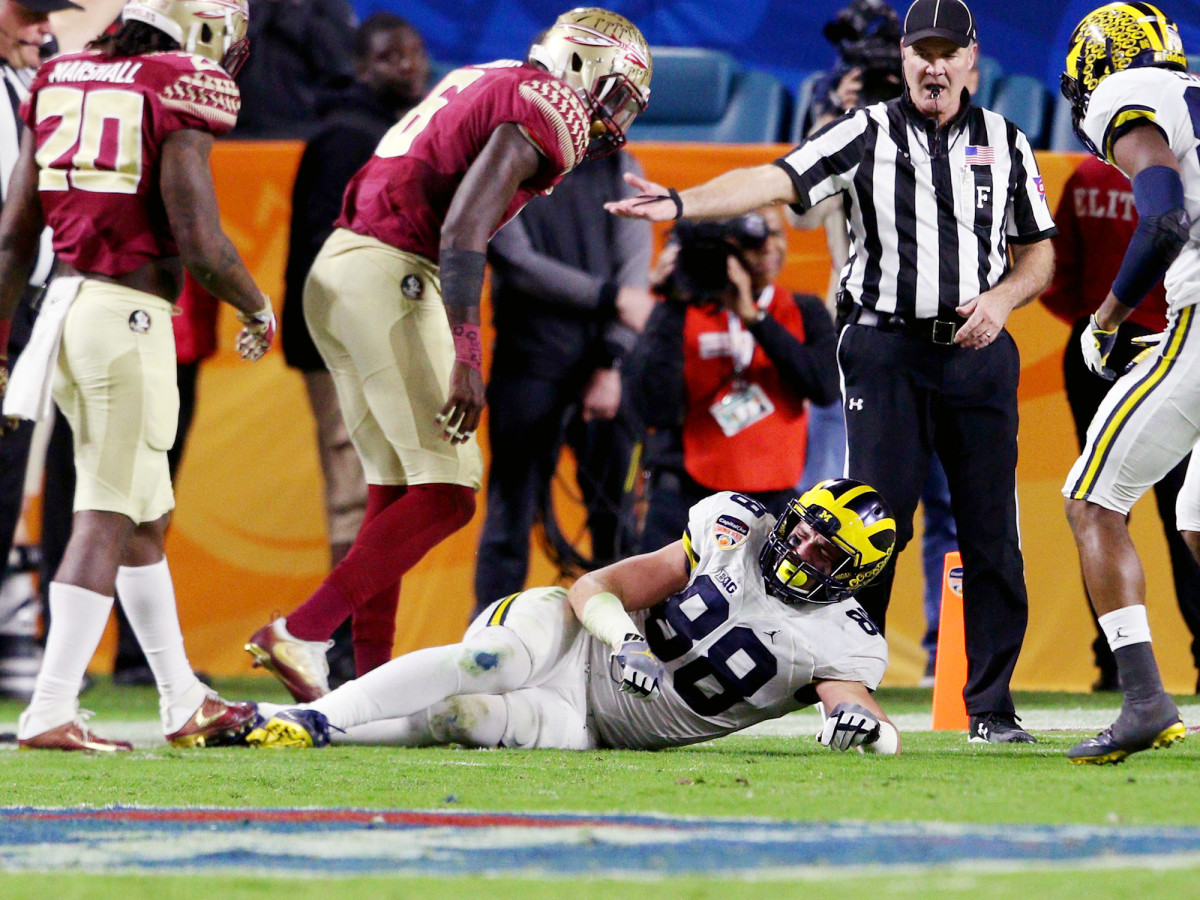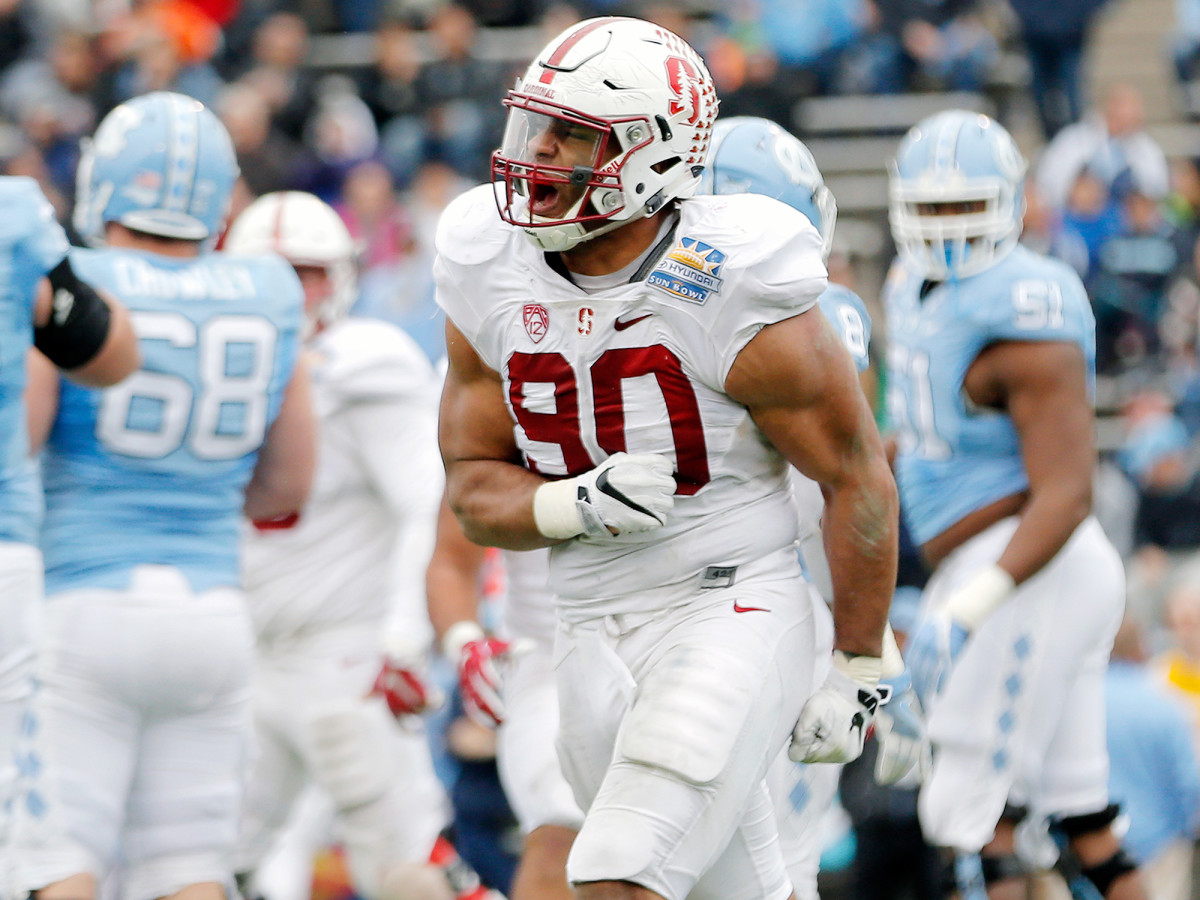Will more college football players skip bowl games? A new NFL-college divide emerges

PHILADELPHIA — As Thursday night crept toward Friday morning, a black Chevrolet Suburban SUV idled in the quiet Philadelphia night. Notre Dame coach Brian Kelly stood outside after the first round of the NFL draft, reflecting on LSU’s Leonard Fournette and Stanford’s Christian McCaffrey getting picked in the top 10 after not playing in their bowl games.
Both McCaffrey and Fournette were healthy enough to play but ultimately didn’t participate. A flurry of debate and some doomsday predictions followed their choice. But ultimately, their high picks on Thursday—Fournette went No. 4, McCaffrey No. 8—showed it had no bearing on their NFL futures.
Before Kelly jetted from Philadelphia, he and other college football coaches tap danced around a new reality in the football landscape. The topic of skipping bowl games has become a Rorschach Test for the perspective of your football seat. While NFL officials brushed off Fournette and McCaffrey’s decisions as obvious, college coaches like Kelly are carefully confronting a new reality that elite NFL prospects skipping non-College Football Playoff bowl games will become an annual occurrence.
“I don’t think so,” Kelly said when asked if this marked the start of a trend. “I think those [decisions] are so individual. I think it has a lot to do with the individual. I think it has a lot to do with team dynamics. If they are captains, do they do that? I just think there’s so many factors to say, ‘O.K., we’ve opened up a new case here.’”
The Big 12 could be in big trouble, more college football takeaways from NFL draft
At the very least, this draft portends a whole new conversation to the college football season. Along with the selection of McCaffrey and Fournette, there are also the cautionary tales of horrific bowl game injuries that cost significant money to Notre Dame’s Jaylon Smith (estimated $15 million) in 2016 and Michigan’s Jake Butt (estimated $2.5 million) this year. UCLA coach Jim Mora may have summed up the dilemma best: “It’s a tough one. I don’t think there’s a correct answer. It depends on what your vantage point is.”
On the college football side, the vantage point is strongly that coaches and administrators don’t want this trickle of players skipping bowl games to become a stream. They point to players like Texas A&M’s Myles Garrett, long projected as the No. 1 pick in the draft, playing in the off-the-radar Texas Bowl. While it’s unlikely there will be dozens of players skipping bowl games, it wouldn’t be surprising in the future years to see the number approach or pass double digits. The specter of skipping bowl games is now part of the landscape, a conversational touchstone like Heisman Trophy contenders and early-entry draft candidates. “Clearly, this makes one attentive in a brand new way,” SEC commissioner Greg Sankey said in a phone interview Monday.
Mora, a former NFL head coach, provided the most holistic viewpoint in Philadelphia. When wearing his college coaching hat, he said he doesn’t like the trend because “it hurts programs.” But he’s also quick to point out that there’s a family side to the equation and an agent perspective. How could a millionaire college coach ask a player on the cusp of an eight-figure contract to risk it for the glory of the Foster Farms Bowl? “If that’s the move they have to make,” Mora said, “I’d certainly understand that.”
Clemson coach Dabo Swinney may have been the most outspoken coach against the trend. He said as a player, he could have never imagined not playing and he wants players with similar approaches. “At the end of the day, any game is a risk,” he said. “Why play at all your senior year? Why play at all? That’s my personal opinion. But to each his own. If I have someone who doesn’t want to play, don’t play. Just let me know so I can get the next guy ready and we’ll put the next 11 out there and compete.”
Penn State coach James Franklin understood why players have made the decision from a business perspective. But he also said it’s “hard to swallow” considering the intrinsic team dynamics of football. “I don’t mean this as a knock to any of these guys, but especially at the running back position, you didn’t get there by yourself,” Franklin said. “Those offensive linemen had a big part of your success. Those tight ends and quarterbacks had a big part of your success.”

Earlier last week, Nittany Lions star Saquon Barkley took four minutes to answer a question about skipping bowl games. He thought out loud as he spoke, changing his mind a few times. He said he’d never do it, then backtracked before he finished answering. His uncertainty offered a window into both the novelty and ambiguity surrounding the issue. Barkley is a rising junior at Penn State and the most likely candidate to follow the tailback renaissance started by Ezekiel Elliott and Leonard Fournette to end up as a top five pick in the 2018 NFL draft. Barkley said he agreed with Fournette and McCaffrey’s decision and questioned anyone judging them, as they don’t know the players’ injury situations or financial realities. He ultimately concluded each decision, including his, should be judged on a case-by-case basis.
“I would have a hard time doing it,” Barkley said. “But I’m not going to sit here and say I would never do it. I don’t know. I could be in a situation next year where I have close to two broken ankles, God forbid, or something going on in my upper body and I can’t play in a game if I’m considering playing in the NFL.”
Which schools won the NFL draft's first round?
NFL officials speak with a bluntness about this issues that offers a sharp contrast to the idealism and wistfulness of college coaches. When discussing Fournette for a feature a few weeks ago, NFL officials consistently chuckled at the notion of skipping a bowl game hurting his or McCaffrey’s draft stock. “He’s got a billion-dollar set of knees,” one personnel director said of Fournette. “What are you doing playing in a nothing bowl game?”
Added another personnel director after the draft: “I think you will see more top players do it due to the minimal effect it had on their draft stock. If a player’s team isn’t playing for a national title, why risk your future earnings? The NCAA isn’t paying them.”
But he added: “If you are not a top pick, your ass better play in the [bowl] game.”
NFLPA President Eric Winston backed up that notion in an insightful conversation with Albert Breer of the MMQB over the weekend. “The thing that’s changed is that another false narrative has been proven false once and for all,” Winston told Breer. “The whole idea that, ‘Man, if you sit out your bowl game, then they’re gonna think less of you and you won’t get drafted as high,’ has obviously been proven false again.”
Numerous folks at both the college and NFL level pointed out how agent influence will determine the intensity of this trend. What the average college football fan drastically underestimates is how ingratiated top prospects are with agents by the time they declare. Agents spend years building relationships with prospects and their families, casting themselves as looking out only for a prospect’s best interest. (They contrast themselves with coaches, who they claim are looking out for their programs.) Those prospects already indebted to agents through financial incentives, a common reality in a competitive landscape, will be more likely to listen. For the agents, the decision to sit out a bowl game enables them to sign the prospect a month earlier, which allows them to avoid any 11th-hour surprises.

Prior to the start of the draft on Thursday, Stanford coach David Shaw sat at a table in a hotel lobby and unintentionally offered a counter-argument to the trend. A woman approached Shaw, who immediately got up and locked in a long embrace. He returned to the interview with a big smile on his face: “Solomon Thomas’s mom.” Thomas ended up as the No. 3 pick in the draft in part because of his performance in the Sun Bowl game McCaffrey made famous by skipping. Thomas made the game-winning sack and finished with seven tackles and two tackles for loss. Shaw’s phone lit up after the game from scouts saying how impressed they were with Thomas, who wasn’t a certainty to be picked in the first round before the game. “That bowl game becomes of paramount importance,” Shaw said. “That’s what you saw from Solomon. You saw fresh, explosive—it was a great time to evaluate him.”
There’s also the cautionary tale of Baylor tailback Shock Linwood, who skipped the Cactus Bowl to focus on the NFL. Linwood, who had off-field issues, wasn’t in the same stratosphere as McCaffrey or Fournette as a prospect, and now Baylor’s all-time leading rusher has yet to even sign a free agent deal, in part because he flopped his pro day.
But Linwood appears to be more of an advisory for marginal prospects than an example that will slow the trend for potential top picks. While the viewpoints on this issue still vary by one’s perspective, few would argue that the financial drivers behind this trend will disappear. “It’s a new phenomenon,” Mora said. “It’s uncharted.”
And as Kelly and other college coaches departed from the NFL draft, they faced a new reality on the horizon.
